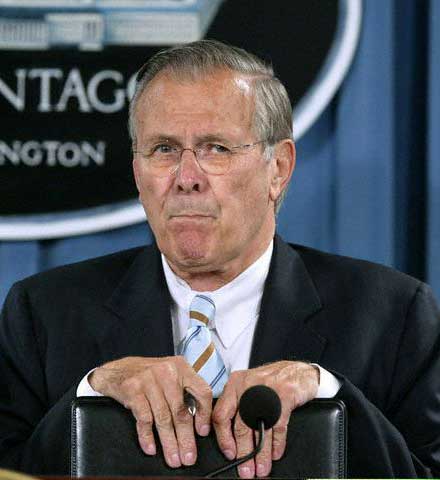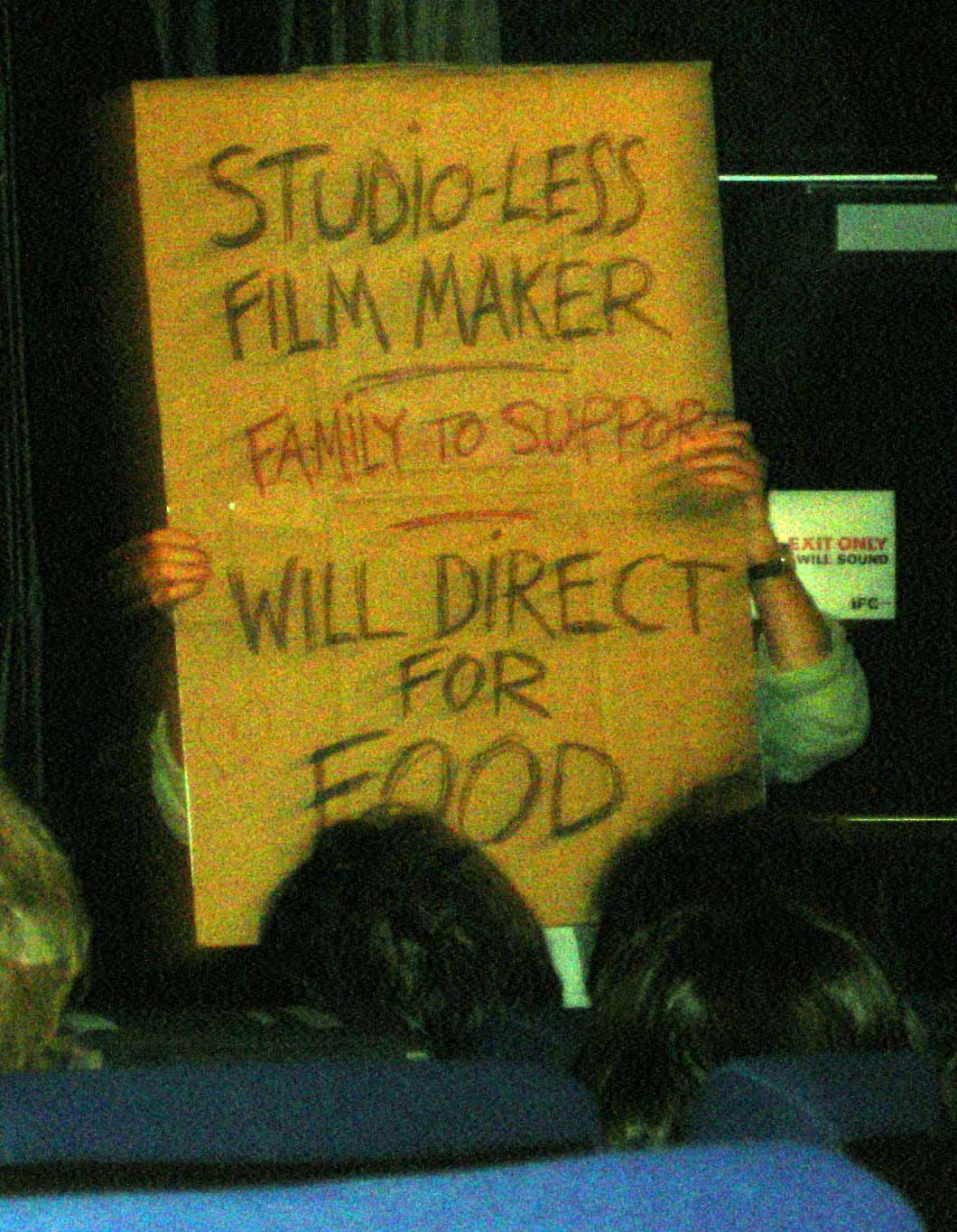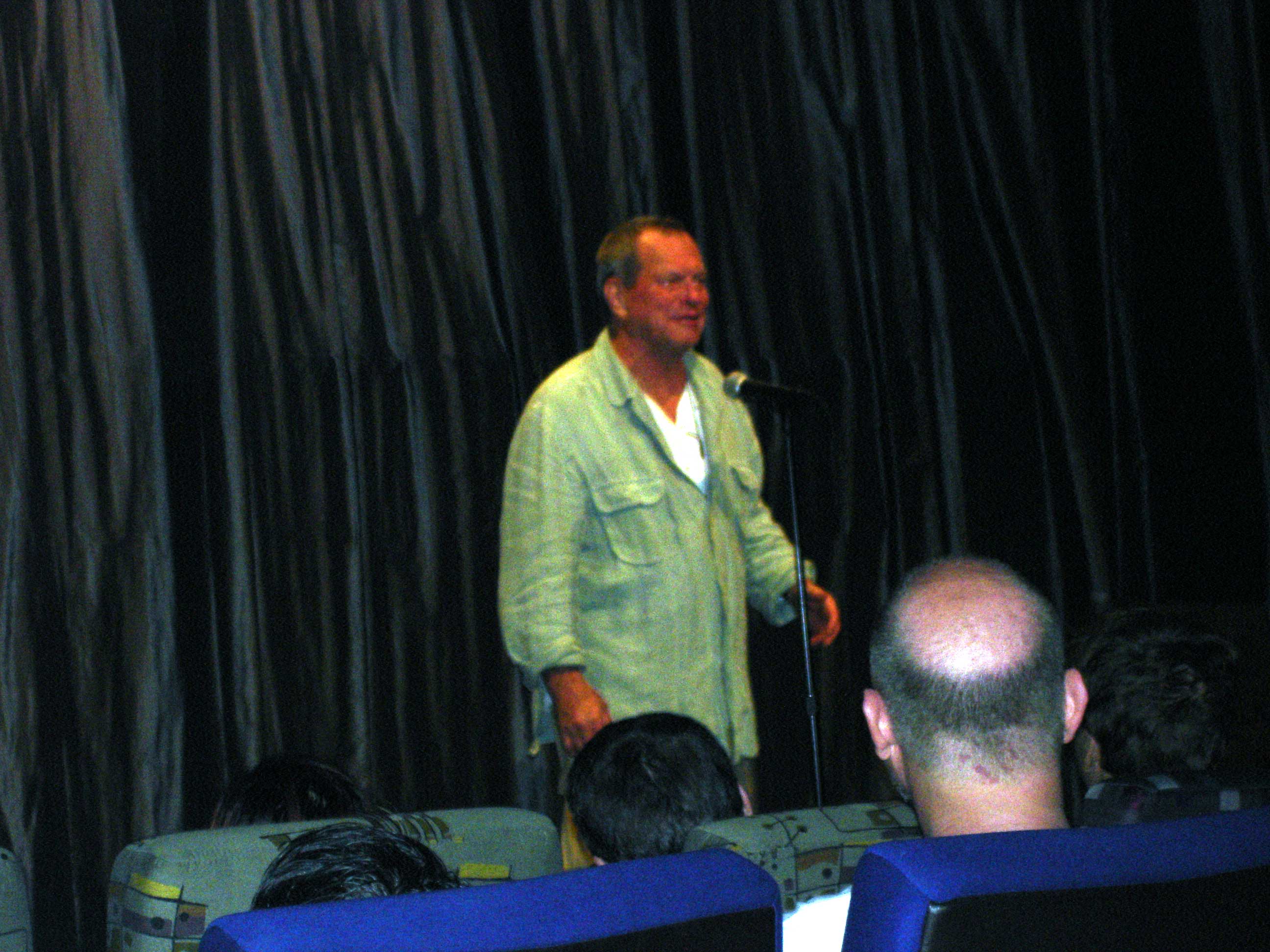“Historians are loath to predict the future. It is impossible to say with certainty how Bush will be ranked in, say, 2050. But somehow, in his first six years in office he has managed to combine the lapses of leadership, misguided policies and abuse of power of his failed predecessors. I think there is no alternative but to rank him as the worst president in U.S. history.” Columbia’s Eric Foner makes the case for Dubya as the worst president ever. Also weighing in on the question: Columbia PhD (and Slate columnist) David Greenberg, Douglas Brinkley, Michael Lind, and Vincent J. Cannato. (I discussed Dubya’s ranking briefly here.)
Tag: War on Terror
The Spoilsmen Persist.
“We think this is extremely crucial…[but there are] a lot of old bulls in both parties who just don’t want to do it.” Speaking of which, paging Tommy Carcetti…Finding it’s harder to shake out the old system than anticipated, the incoming Dems are already backing away from a key 9/11 panel suggestion, one that would centralize congressional oversight and funding of intelligence matters in the intelligence subcommittee (to be chaired by Reyes, a.k.a. not-Hastings/Harman) at the expense of the armed services and appropriations defense subcommittees (the latter of which will be chaired by also-ran Murtha.) “Democratic leadership dust-ups this month severely limited the ability of House Speaker-elect Nancy Pelosi (Calif.) to implement the commission’s recommendations, according to Democratic aides.“
Come to Daddy.
“I frankly think it’s a natural default from the failure of this advice of the people they had. It was impossible to argue anymore that some of the people who got us into this mess were giving good advice.” With Dubya’s White House in shambles, will Bush 41’s team ride to the rescue? Let’s hope so — I much prefer those guys to the militant neocon wing that’s been holding the reins the past six years. Still, as one observer pointed out: “Bush’s mind works differently from the normal political mind…Maybe these Baker guys can talk him off the ledge, but nobody’s done it yet.”
Rum Out.
Christmas in November continues for the reality-based community: Along with recent editorials in the Army Times, the Dem’s Election 2006 takeover claims another high-profile GOP victim in Donald Rumsfeld. He’ll be replaced by former CIA chief Robert Gates — an old papa Bush hand and current member of the Baker-Hamilton commission — for Dubya’s last two lame duck years. Dubya claimed in his press conference that Rumsfeld would’ve been gone regardless of the election returns…I’m not sure I buy that. Still, this is a very welcome move — one that should’ve happened years ago.
They Have the Bodies.
Wasting no time after signing the godawful terrorism bill into law, Dubya tells the US District Court that it has lost jurisdiction over habeas corpus petitions filed by Gitmo detainees. “What’s being blocked and what the government is opposing tooth and nail is the most simple thing of all: a hearing before a district court judge,’ said Jonathan Hafetz, who handles many detainee cases for the Brennan Center for Justice at New York University School of Law. ‘The government will do anything to prevent Guantanamo detainees from being able to present evidence in court.‘”
State of Denial?
“What’s maddening is the way Woodward reverses his point of view without acknowledging he ever had one — then or now. You could charge him with flattering politicians only when they’re up, and piling on when they’re down. But you might as well accuse a weathervane of changing its mind about which way the wind should blow.” Slate‘s Jacob Weisberg examines Bob Woodward’s treatment of Donald Rumsfeld through his three Dubya books (most recently State of Denial) and finds him a fickle beast at best.
Terry le Heros.
As longtime readers might know (or might’ve adduced from some of the site banners above), I’ve always been a big Terry Gilliam fan, and will pony up for films considerably worse than The Brothers Grimm to repay the man for making Time Bandits, Fear and Loathing in Las Vegas, and one my all-time favorite movies, Brazil. (In fact, “Ghost in the Machine” is the name of this site partly for the Brazil reference.) So it was a real treat yesterday when I and a friend from high school got to see Terry Gilliam live in the flesh last night at the IFC Center on 4th St. After making the rounds in front of The Daily Show yesterday afternoon, Gilliam showed up as part of IFC’s Movie Night series, in which a director of some repute screens one of his favorite films. (In fact, he showed up with the sign he’d been lugging around outside all day: “STUDIOLESS DIRECTOR — FAMILY TO SUPPORT — WILL DIRECT FOR FOOD”) Apparently, Gilliam had wanted to show One-Eyed Jacks, the 1961 western directed by Marlon Brando, but the Brando estate wouldn’t deliver a print or somesuch.
So, the film we got instead was Jaco von Dormael’s Toto le Heros (Toto the Hero), a bizarre Belgian concoction of 1991 that’s part Prince and the Pauper, part Singing Detective, part Citizen Kane and very Gilliamesque. A movie that’s hard-to-explain but that’s definitely worth renting, Toto follows the story of one Thomas van Haserbroeck (Don’t call him van Chickensoup), an imaginative young boy unsettlingly in love with his sister, a lonely man contemplating an affair with a mystery woman, and a deeply depressed senior citizen looking to exact revenge for a life-long grievance. Y’see, Thomas (or Toto, as he’s called in his dream life, where he’s a film noir gumshoe) insists he remembers being switched with another baby — his wealthy next-door neighbor, Albert Kant — during a fire at the hospital, and therein, in his mind, lies the source of most of his troubles. As the story switches back and forth in time, Toto and Albert’s lives keep butting against each other in strange doppelganger fashion, while old-Thomas enacts a plan to reclaim his stolen life…
After the movie, Gilliam returned to the front for a wide-ranging Q&A session, which involved questions both probing (“Did you borrow from Toto in 12 Monkeys?” [No, don’t think so.]) and peculiar (“Where’d you buy your shoes? Where’s the worst place you ever spent the night?” [Birkenstocks, some backwater hut in India]) Along the way, Gilliam told tales of first meeting the Python guys, photographing Frank Zappa in 1967, choosing his various directors of photography, and, the battle of Brazil notwithstanding, generally enjoying the constraints of studio heads and limited budgets. (They focus him.) Speaking of which, he also said Good Omens still seems to be moving forward, and Quixote may still happen someday. (He also mentioned The Defective Detective briefly, but it seemed in the past tense.) And these days he’s digging the new Dylan album, as well The Arcade Fire’s Funeral and The Flaming Lips’ At War with the Mystics.
At one point, he also said he was considering suing Bush, Cheney, et al for making an unauthorized remake of Brazil. With that in mind, I asked him whether his views on Brazil had changed at all now that we’re kinda living it. (I mean, what with Cheney playing Mr. Helpmann, Canadian citizens getting Buttled, and the Dubya team now fully sanctioning Jack Lints, what’s a good Sam Lowry to do, other than await his turn in the chair or on the waterboard?) He noted that, obviously, Brazil-type stuff was going on around the world at the time (in the Soviet bloc, Argentina, etc.) but that he watched the film the other day (to check out the new Criterion HD-DVD version) and was amazed at both how prescient and topical it was.
Throughout, Gilliam was amazingly friendly and personable, and came across a remarkably humble and down-to-earth guy. He kept taking questions well after the IFC-suit tried to close down the affair, and hung around the nearby cafe afterwards to sign various items. I ended up being the second guy in line, and got him to sign the Brazil still above (one of five I have framed in my hallway.) When he asked me my name for the signature, he lit up, “Kevin! Time Bandits Kevin!” I told him I was right around that age when I first saw Time Bandits, and he’s definitely got a lot to answer for.
Feral Lapdog?
“The disclosures so far have been devastating. The book paints the administration as clueless, dishonest, and dysfunctional.”” Slate‘s John Dickerson surveys the likely political impact of Bob Woodward’s State of Denial, which broke today (in the NYT, strangely enough) and which is apparently much more critical of the neocons than his last two puff pieces, Plan of Attack and Bush at War. Of course, we’ve all known that the Dubya White House is chock-full of scheming, untrustworthy, incompetent loons for years now, but apparently, when Bob Woodward finally figures it out, it’s suddenly newsworthy. Oh well, I’ll take it.
The United States of Torture.
“We don’t blame the Democrats for being frightened. The Republicans have made it clear that they’ll use any opportunity to brand anyone who votes against this bill as a terrorist enabler. But Americans of the future won’t remember the pragmatic arguments for caving in to the administration. They’ll know that in 2006, Congress passed a tyrannical law that will be ranked with the low points in American democracy, our generation’s version of the Alien and Sedition Acts.” Abu Ghraib becomes standard operating procedure as Dubya’s terror bill — horrifying as it is — passes the House 253-168 (roll call) and the Senate 65-34 (roll call.) Twelve Senate Dems (well, eleven Senate Dems and Lieberman) voted for the bill: Carper, Johnson, Landrieu, Lautenberg, Menendez, Nelson, Nelson, Pryor, Rockefeller, Salazar, Stabenow. Chafee was the only Republican to vote against it, Snowe abstained.
Shameful, pitiful, demoralizing, pathetic. What else is there to say? As Rebecca Blood sums it up (via Medley): “We have lost the war on torture. It’s devastating.“
The Knights who say NIE.
“Four underlying factors are fueling the spread of the jihadist movement: (1) Entrenched grievances, such as corruption, injustice, and fear of Western domination, leading to anger, humiliation, and a sense of powerlessness; (2) the Iraq ‘jihad;’ (3) the slow pace of real and sustained economic, social, and political reforms in many Muslim majority nations; and (4) pervasive anti-US sentiment among most Muslims — all of which jihadists exploit.” In a sorry attempt at a document-dump diversion, the precis of the National Intelligence Estimate report cited over the weekend has been declassified by order of the Dubya administration, so as to help blur one of its central contentions in the public mind (point #2 above): The Iraq War has served to fuel the expansion of terrorism against the US and its allies. (Update: If you’re here from Daniel Drezner’s blog, welcome, and have a look around.)







